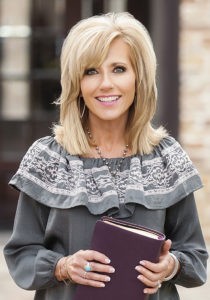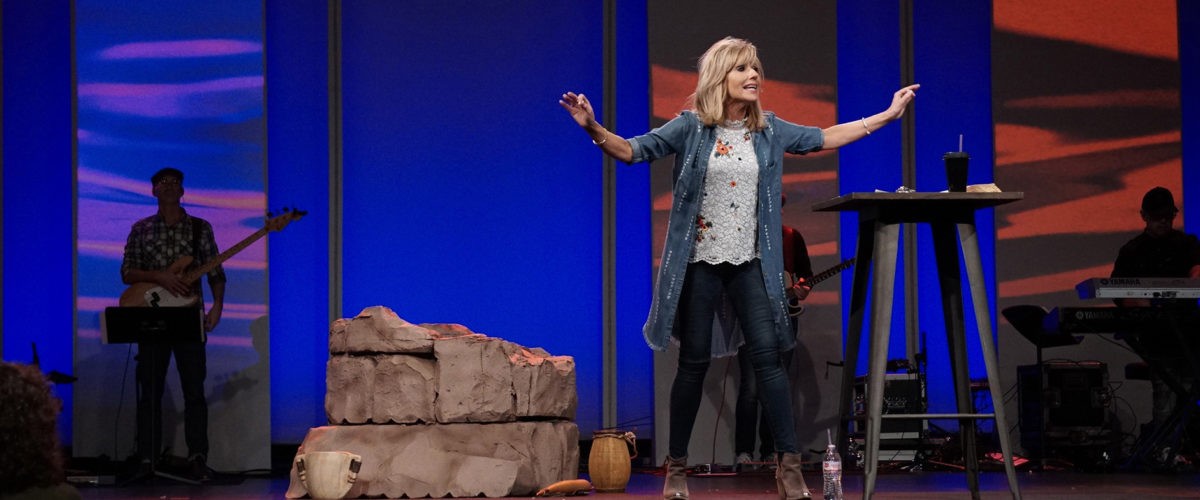Beth Moore’s recent defection from the Southern Baptist Convention has been a long time coming. Moore built her career modeling Southern Baptist, submissive womanhood, but her public witness has challenged the gender roles that she, until very recently, defended.
Moore’s permission to be a Southern Baptist preacher always depended on her reinforcement of the heteronormative patriarchy, not to mention netting the highest gross book sales in Lifeway’s catalog. Moore’s previously implicit challenge to SBC gender norms has since become explicit as she openly defied a majority of evangelical leaders by denouncing Donald Trump and later endorsing the #MeToo movement as a survivor of sexual assault.
Consequently, she lost favor with conservative evangelicals over their greater desire to uphold the GOP, which emboldened Moore to speak not only against evangelical hypocrisy but also in favor of women in ministry, effectively coming out of the clergy closet. That trajectory always was incompatible with SBC fundamentalism, and her breakup announcement was the inevitable conclusion of a half-decade battle.
The Beth Moore Effect
The Beth Moore Effect is like an evangelical beauty regimen, where spiritual growth and heteronormative, Southern gender norms masquerade as Christian orthopraxis. For more on how she used this to mask her preaching ministry, see my chapter in A Marginal Majority.
 As a stay-at-home mom, Moore started a Bible study for women at First Baptist Church of Houston, which by the early 1990s was drawing thousands of women; online streaming later added thousands more. Lifeway took notice, and Moore soon topped Lifeway’s sales charts, publishing dozens of books and selling out arenas and concert venues nationally. Most importantly to the SBC, Moore fed the literature and programming of the growing conservative women’s ministry movement.
As a stay-at-home mom, Moore started a Bible study for women at First Baptist Church of Houston, which by the early 1990s was drawing thousands of women; online streaming later added thousands more. Lifeway took notice, and Moore soon topped Lifeway’s sales charts, publishing dozens of books and selling out arenas and concert venues nationally. Most importantly to the SBC, Moore fed the literature and programming of the growing conservative women’s ministry movement.
Although herself a woman behind a pulpit, Moore’s language encouraged women’s explicit affirmation of male authority as Christian necessity, starting with women’s roles in marriage and family. Moore has consistently portrayed her personal life as a submissive, happily married wife, mother and grandmother. She suggested that women defying typical affluent Southern patriarchal norms must be in psychological denial of their femininity as a self-defense mechanism since “all insecurity is a cover-up for unbelief.”[1]
Thus, she normalized her particular understanding of femininity as prescriptive for what all Christian women should want, claiming that a Christian woman who does not perform gender similarly must be in unbelief.
Patriarchy and equality
Complicating the picture, Moore sometimes costumed patriarchy as equality. In Beloved Disciple, she taught her audience to “see ourselves as beloved disciples,” suggesting that as God called John, described in the New Testament as the “beloved disciple,” God calls believers today, male and female.[2]
Likewise, in So Long Insecurity, she assumed Paul’s address to “brothers” includes women: “The thought never occurred to me that Jesus didn’t call girls to follow him alongside the boys. … We might be commissioned to do different things, but Jesus ministers next to men and women alike … . (Calling) is used in reference to the way every Christian, regardless of gender, first comes to Christ (Romans 8:30).”[3]

Beth Moore with her husband, Keith.
She has regularly described her marital relationship as one of “mutual respect” and in her teaching has occasionally spoken directly to men on how to be good husbands, offering yet another example of challenging her own message of complementarian submission.[4] Praising women’s organizing during September 2017 Hurricane Harvey relief efforts, Moore tweeted: “An 18 wheeler pulling up with aid from Lubbock. A young woman in Lubbock organized it. That’s some Girl Power in the name of Jesus who has a long history of calling women to mighty things!”[5]
While Moore always has claimed to teach, not preach, her ministry matches identically what evangelical men do when preaching. She stands behind a pulpit, which she calls a “Bible stand,” expositing the Bible for those gathered, explaining the text and its contemporary relevance. Moore’s flourishing ministry in a complementarian SBC culture reveals the subversion of absolute patriarchy possible for women who can navigate cultural gender norms.
What women wanted to hear
Without being controversial or explicitly bucking the SBC’s gender hierarchy, Moore found a way to preach by saying what they wanted her to say and looking like they wanted women to look. Her submissive yet exuberant femininity maintained respectability within conservative evangelicalism. Her gender performance nullified any accusation of preaching, creating space for her independence and leadership. Keith may wear the boots, but Beth effectively wears the pants.
Over time, Moore’s performance has undermined the very binary she claims to support. As women have flocked to women’s ministry seminary programs, becoming the next Beth Moore presents an appealing possibility. As a preacherly paradox, her ministry has challenged new generations of SBC women to follow God’s call in untraditional ways. And for most of her ministerial career, it seemed that paradox would hold, until the #MeToo movement.
“Over time, Moore’s performance has undermined the very binary she claims to support.”
Then came #MeToo
In October 2016, a leaked 2005 recording of presidential candidate Donald Trump and Billy Bush exposed Trump as bragging “in vulgar terms about kissing, groping and trying to have sex with women” without consent, justifying his actions on the basis of his celebrity.[6] Moore long shared her story as a sexual violence survivor, but this incident pushed her to social media as a new platform to critique men’s abuse of power and rally other Southern Baptists, men and women, to her side.
Moore’s first tweet in response to Trump read: “Wake up, Sleepers, to what women have dealt with all along in environments of gross entitlement & power. Are we sickened? Yes. Surprised? NO. Try to absorb how acceptable the disesteem and objectifying of women has been when some Christian leaders don’t think it’s that big a deal.” In the same tweet, Moore drew attention to herself. “I’m one among many women sexually abused, misused, stared down, heckled, talked naughty to. Like we liked it. We didn’t. We’re tired of it.”[7]
Not only did Southern Baptists not condemn Trump for his actions, but many increased their devotion to his campaign. Despite the family values rhetoric of the SBC and Moore’s efforts to expose the hypocrisy of Trump’s campaign, since his election, the SBC and other conservative evangelical groups have continued to defend, even idolize, Trump as divinely chosen to restore Christianity to America. Moore, then, found herself no longer the SBC darling.
Moore’s sudden marginality empowered her, and she rejected what she viewed as the evangelical alliance with the GOP prioritizing politics over accountability. In November 2017, she tweeted, “This idea that God puts up with secret sins from His servants for the greater good is a total crock.”[8]
“She rejected what she viewed as the evangelical alliance with the GOP prioritizing politics over accountability.”
With matters of sexual harassment and abuse, Moore used her Twitter and blogging platforms to call for independent thinking, for sometimes not submitting, and for risking loss of approval for faithfulness:
God’s overarching agenda for believers: CHANGE. To Continually develop in Christlikeness. To increasingly see & love & respond as Jesus did. Risk being the only one in your familiar circle who changes your mind if that’s what it takes. To never change your mind is to never change. ROCK THE BOAT. And if it needs sinking, let Jesus sink it. It could be the very thing He uses to throw life preservers to the living dead. I’m so tired of aphorisms from people with their heads in the sand I could throw up. Let’s get our heads out, eyes open & serve in this mess.”[9]
‘Responsibilty for the gospel’
As Moore would have it, “the responsibility for the gospel” resided with church, not state.[10] Critiquing the evangelical-GOP alliance, Moore tweeted: “The consistent casting off of restraint of any leader who wields considerable power — 1st & foremost in the house of God — ought to terrify us. There are issues & times when we must land on 1 side or the other. This tweet is about going past party lines in allegiance to Jesus alone.”[11]
Addressing a Public Religion Research Institute poll finding — “White evangelical protestants are now more tolerant of immoral behavior by elected officials than the average American” — Moore replied, “This is what happens when we sell our souls to buy our wins. The huge irony is that we do it in Jesus’ name. I don’t think He’s taking credit for this.”[12]
Officially disavowing herself of affiliations, she tweeted: “If you want me to answer to it, don’t call me evangelical/ conservative/ liberal/ Baptist/ Pentecostal/ Republican/ Democrat. It’s Jesus follower.”[13]
In the fall of 2017, for instance, she wrote, “A fog had cleared that I couldn’t cloud back up. I saw things I couldn’t unsee.” As a result, she aknowledged, the “Ways I’ve been kidding myself … (have) been part of the problem instead of part of the solution … (I’ve) been a coward. A people pleaser. A crowd pleaser … been acceptably Christian in many circles maybe, but not Christlike.” She added: “Too much is at stake and too many people dying and suffering to take the cheap route.”[14]
“Too much is at stake and too many people dying and suffering to take the cheap route.”
Sexual harassment in the news
These posts emerged as numerous Hollywood women accused movie mogul Harvey Weinstein of sexual assault and harrassment. These accusations revived the #MeToo hashtag, originated by Tarana Burke 10 years prior, as celebrities tweeted about their experiences, inspiring millions of women to follow suit.
Moore immediately returned to Twitter: “A well-meaning mentor told me at 25 that people couldn’t handle hearing about sexual abuse, and it would sink my ministry. It didn’t. #MeToo.”[15]
As accusations spread, and more men were implicated, SBC leaders and conservative evangelicalism remained silent. Moore responded to their seeming indifference by escalating her rhetoric: “One reason why we can’t seem to repent and get on with the business of God is because we are having serious trouble calling things what they are … .Sexual assault is not an issue. It’s a crime. CRIME. Crime.”[16]
And if that were not enough, she hit hard: “It’s been a harrowing trip to Oz for many evangelicals this year, the curtain pulled back on the wizards of cause. We found a Bible all right, seemingly used instead of applied, leveraged instead of obeyed, cut and pasted piecemeal into a pledge of allegiance to serve the served.”[17]
After women successfully lobbied for the firing of Paige Patterson, Bill Hybels and Andy Savage for sexual misconduct, Moore’s critique turned even more defiant, and on May 3, 2018, she posted “A Letter To My Brothers,” as a candid memoir of her experience as a woman leader in evangelicalism and searing condemnation of its patriarchical leadership.[18] Moore’s blog made clear that her call was “to teach and to serve women,” with “no desire to pastor.”
After thanking her supporters, she disclosed the harsh reality of sexism:
“I issued disclaimers ad nauseam. I wore flats instead of heels when I knew I’d be serving alongside a man of shorter stature so I wouldn’t be taller than he.”
As a woman leader in the conservative Evangelical world, I learned early to show constant pronounced deference — not just proper respect which I was glad to show — to male leaders, and when placed in situations to serve alongside them, to do so apologetically. I issued disclaimers ad nauseam. I wore flats instead of heels when I knew I’d be serving alongside a man of shorter stature so I wouldn’t be taller than he. I’ve ridden elevators in hotels packed with fellow leaders who were serving at the same event and not been spoken to, and, even more awkwardly, in the same vehicles where I was never acknowledged. I’ve been in team meetings where I was either ignored or made fun of, the latter of which I was expected to understand was all in good fun. I am a laugher. I can take jokes and make jokes. I know good fun when I’m having it and I also know when I’m being dismissed and ridiculed. I was the elephant in the room with a skirt on. I’ve been talked down to by male seminary students and held my tongue when I wanted to say, “Brother, I was getting up before dawn to pray and pore over the Scriptures when you were still in your pull ups.”
Moore tolerated critiques from “hyper-fundamentalists based on snippets taken out of context and tied together,” because she believed they were doing what they believed was right. But it was Trump’s rise, championed by the SBC, that awakened her to “misogyny, objectification and astonishing disesteem of women” and a “demoralizing realization.”
Accoring to Moore, “Scripture was not the reason for the colossal disregard and disrespect of women among many of these men. It was only the excuse. Sin was the reason.”[19]
She could no longer give the benefit of the doubt:
This is where I cry foul and not for my own sake … (but) for sake of my gender, for the sake of our sisters in Christ and for the sake of other female leaders who will be faced with similar challenges. I do so for the sake of my brothers because Christlikeness is at stake and many of you are in positions to foster Christlikeness in your sons and in the men under your influence. The dignity with which Christ treated women in the Gospels is fiercely beautiful and it was not conditional upon their understanding their place.[20]
Evangelicalism’s treatment of women
Moore’s letter challenged conservative evangelicalism’s treatment of women in two important ways.
First, she named the hypocrisy of so-called Bible-loving churches, “quick to teach submission” and “often slow to point out that women were also among the first followers of Christ (Luke 8), that the first recorded word out of his resurrected mouth was ‘woman’ (John 20:15), and that same woman was the first evangelist.”
“She named the hypocrisy of so-called Bible-loving churches.”
Second, she called for repentance: “I’m asking that you would simply have no tolerance for misogyny and dismissiveness toward women in your spheres of influence.” If the church wished to imitate Christ, according to Moore, it must imitate “his attitude and actions toward women.”
She then apologized for her past “aqueiscence and silence,” which made her “complicit in perpetuating an atmosphere in which a damaging relational dynamic has flourished.” Later that year, in her first-ever interview with a reporter about her public ministry, she said, “The old way is over. The stakes are too high.”[21]
Moving off script
The Beth Moore Effect is not as predictable as once before. Moore moved off script, and in so doing exposed the lengths to which some evangelical leaders would go to maintain their power.
On March 9, 2021, Moore made it official with her statement: “I am still a Baptist, but I can no longer identify with Southern Baptists.”[22] Like all divorces, the decree names already-present reality. Moore played the gender roles game until doing so forced complicity with sexual assault, which she simply could not do as a survivor.
Once she stopped toeing the company line, she lost SBC favor, as have countless women in Christian history. And by that time, Moore was secure enough in herself and her calling that she didn’t let it stop her.
 Courtney Pace serves as the Prathia Hall Scholar in Residence of Social Justice History for Equity for Women in the Church. She earned a Ph.D. in religion from Baylor University, a master of divinity in theology from George W. Truett Theological Seminary, and an honors bachelor of science in computer science engineering from the University of Texas at Arlington. She researches social justice movements in American religion, particularly race and gender. She is the author of Freedom Faith: The Womanist Vision of Prathia Hall and numerous peer-reviewed articles, book chapters, book reviews, and encyclopedia articles. She is an ordained Baptist minister and the proud mother of Stanley. She is also the creator of the Stole Sisters podcast, which features women preachers of all Christian traditions. Follow her on Twitter (@RevDrMom_Pace) and Facebook (RevDrMom).
Courtney Pace serves as the Prathia Hall Scholar in Residence of Social Justice History for Equity for Women in the Church. She earned a Ph.D. in religion from Baylor University, a master of divinity in theology from George W. Truett Theological Seminary, and an honors bachelor of science in computer science engineering from the University of Texas at Arlington. She researches social justice movements in American religion, particularly race and gender. She is the author of Freedom Faith: The Womanist Vision of Prathia Hall and numerous peer-reviewed articles, book chapters, book reviews, and encyclopedia articles. She is an ordained Baptist minister and the proud mother of Stanley. She is also the creator of the Stole Sisters podcast, which features women preachers of all Christian traditions. Follow her on Twitter (@RevDrMom_Pace) and Facebook (RevDrMom).
Notes:
[1]Moore, So Long, Insecurity, 160.
[2]Beth Moore, Beloved Disciple: The Life and Ministry of John, DVD (Nashville: LifeWay Church Resources, 2002, 2008).
[3]Moore, So Long, Insecurity, 268-269.
[4]Moore, “Insights on Marriage.”
[5]Moore, @BethMooreLPM, Sep. 2, 2017.
[6]David Farenthold, The Washington Post, Oct. 8, 2016, https://www.washingtonpost.com/politics/trump-recorded-having-extremely-lewd-conversation-about-women-in-2005/2016/10/07/3b9ce776-8cb4-11e6-bf8a-3d26847eeed4_story.html, accessed Nov. 26, 2016.
[7]Moore, @BethMooreLPM, Oct. 9, 2016.
[8]Moore, @BethMooreLPM, Nov. 13, 2017.
[9]Moore, @BethMooreLPM, Aug. 17, 2017. See also Kristin Kobes Du Mez, “Gender & Authority: Tish Warren, Jen Hatmaker, and the ‘Crisis’ of the Female Christian Blogosphere in Historical Perspective,” in all things Aug. 31, 2017, http://inallthings.org/gender-authority-tish-warren-jen-hatmaker-and-the-crisis-of-the-female-christian-blogosphere-in-historical-perspective/, accessed Sep. 7, 2017.
[10]Beth Moore, “The Scandal of Election 2016,” http://blog.lproof.org/2016/10/the-scandal-of-election-2016.html, accessed Nov. 28, 2016.
[11]Moore, @BethMooreLPM, Jul. 1, 2017.
[12]Moore, @BethMooreLPM, Dec. 8, 2017; Public Religion Research Institute, @PPRIpoll, Dec. 7, 2017; McKay Coppins, “You Need To Think About It Like A War,” The Atlantic, Dec. 7, 2017, https://www.theatlantic.com/politics/archive/2017/12/the-vanishing-values-voter/547772/, accessed Jan. 16, 2018.
[13]Moore, @BethMooreLPM, Jul. 24, 2017.
[14]Beth Moore, “The Identity Crisis of My Life,” Aug. 17, 2017, https://blog.lproof.org/2017/08/identity-crisis-life.html, accessed Sep. 4, 2017.
[15]Sarah Almukhtar, Larry Buchanan, and Michael Gold, “After Weinstein: A List of Men Accused of Sexual Misconduct and the Fallout for Each,” The New York Times, Nov. 13, 2017, https://www.nytimes.com/interactive/2017/11/10/us/men-accused-sexual-misconduct-weinstein.html, accessed Nov. 14, 2017; Moore, @BethMooreLPM, Oct. 15, 2017.
[16]Moore, @BethMooreLPM, Nov. 9, 2017.
[17]Moore, @BethMooreLPM, Nov. 14, 2017.
[18]Beth Moore, “A Letter To My Brothers,” May 3, 2018, https://blog.lproof.org/2018/05/a-letter-to-my-brothers.html, accessed 06/19/2018.
[19]Ibid.
[20]Ibid.
[21]Green, “The Tiny Blond.”
[22] https://religionnews.com/2021/03/09/bible-teacher-beth-moore-ends-partnership-with-lifeway-i-am-no-longer-a-southern-baptist/, accessed 3/9/2021.


